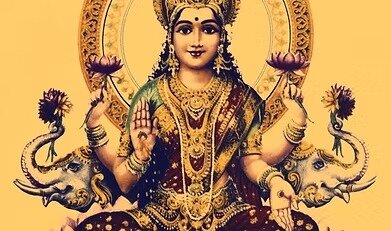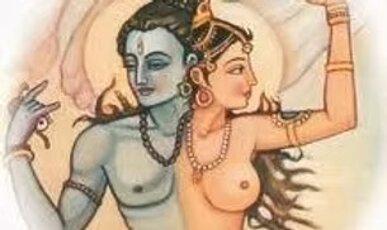CONTACTS:
info@tantrapalermo.com
tel. +39 331 111 07 93
© 2019-2025 TantraPalermo.com
Privacy Policy
SAKTA AND KAULA TANTRISM


The term Kaula is formed from Kula = Shakti and Akula = Shiva. Kaula is the relationship between Kula and Akula, that is, the harmonious union of Shiva and Shakti.
The Kularnava Tantra is one of the most important texts of the Kaula tradition, considered an authority in tantric literature. The book, which is worthy of careful study by those who wish to understand the principles and practice of the tantric path, is presented in the form of a dialogue between the Lord of Yoga, Shiva, and his Shakti, the Mother of the Universe. The Kularnava Tantra is dedicated to the higher aspect of Shiva, called Ardhanarishvara. This aspect unites Shiva and Shakti in a single form, and represents the union of the masculine and feminine principles, ida and pingala (ha-tha). Each chapter is called ullasa or bliss, referring to the divine nectar enjoyed by those who participate in the union of Shiva and Shakti.
Tantra is a guide to spiritual liberation ‘without the limits and constraints’ of social religiosity. The meaning of the texts may at first seem obvious, but most of them use a language that must be interpreted, experienced, and realized at different levels of consciousness. According to tradition, everything has a physical, subtle, and transcendent meaning, and the Devi with Her maya can confuse or enlighten. It is said that the impure person, with an animal mentality (pashu), is predisposed to misunderstand the meaning of the texts. The understanding of the hermetic language of the texts is found by going to the root of tantric philosophy, in the practice of Yoga in which it is realized that there is no Shiva without Shakti, because true yoga is the realization of the unity of all things.
Tantra seeks to harmonize the rights of Spirit with those of Matter. The principle underlying Tantra is to reject nothing that God has created, to use every means to elevate human consciousness to the Divine. It urges man to be aware of the rare privilege that has been granted to him, that is, human birth, in which by becoming aware of himself he is offered the possibility to choose between stagnation and the rapid realization of his own divinity. He is warned not to lose himself in the whirlpools of excitements and transient pleasures, and is also cautioned about the many false paths that abound in this world.
Transmitted orally in the long uninterrupted chain of sacred tradition, the Kaula doctrine is the supreme one, the most protected from the gaze of the impious and those who do not have the necessary qualifications, it is the most secret path. Not everyone can access Kaula knowledge; before its truth can be revealed, certain conditions must be matured, in which one is freed from the distorting elements of ignorance and ego. Kaula knowledge is revealed to those who have purified their consciousness, to those who are calm, active in the ways of the spirit, endowed with humility, and devoted to truth.
Taken from "Kularnava Tantra" The Path of Ecstasy
SAKTHI means strength, power, feminine energy, it is the feminine manifestation of the divine. The veneration of the various forms of Shakti is widespread in India.
In Tantra, the feminine aspect of divine reality represents knowledge in the sense of wisdom (in Sanskrit vidya).
The true worship of the Goddess implies knowledge; it is not simply external worship, but rather an intimate worship akin to meditation. Meditation on the Goddess is a form of spiritual inquiry, a tool for acquiring true knowledge, understood as an integral understanding of reality. It is not the adulation of feminine forms and qualities. Accessing higher knowledge means entering the body of the Goddess and being spiritually reborn. Coming into contact with the Divine Mother and having a personal relationship with her powers allows us to discover the stages of our personal inner transformation.
Dasha Mahavidya means “Ten Great Knowledges.” The Goddesses reveal the inner mechanism of the universe and the psyche. They represent the deepest truths, the truths hidden by our attachment to external forms. Their messages are intoxicating and frightening, representing life itself, but always instructive, especially if one consciously seeks to transcend the ordinary dimension.
The first clear reference to the Ten Wisdom Goddesses is found in the Shiva Purana. From the Vedas to the Tantras there is an unbroken line of mantra and meditative teachings that place the Goddess at the center.
The Goddess, who represents creation at all levels, possesses this same diversification expressed in her Ten Forms of Wisdom (Dasha Mahavidya), and in their different functions:
Kali: the Goddess of transformation
“Om: Victorious, beneficent and auspicious Kali, you who carry a skull, you are liberation, forgiveness, peace, support of all things, divine and ancestral offering. Homage to You! Be victorious, O Goddess who destroys all passions! Be victorious, you who eliminate the pains of all beings! Be victorious, Goddess who pervades all. Like the dark night of time, homage to You!” – VI Mahatmya, Argala Stotra 1-2, Markandeya Purana
Tara: the Salvific Word
“You who are the lady of the word, the climbing vine that satisfies the devotee's desires, you who grant the fulfillment of every undertaking, everywhere adorned with perfect prose and poetry, you who grant realization. You who have three eyes, like the budding blue lotus flower, who are an ocean of mercy, pour, I pray, your grace upon our vision, like an immortal rain of blessings.” – Eight Verses in Praise of Tara, (Tarashtakam) 2
Tripura Sundari: the beauty of the Three Worlds
“She whose eyes are like budding lotus flowers, who is dark as an autumn rain-laden cloud – we take refuge in the wife of Shiva, who has three eyes, Tripura Sundari, the Goddess of the beauty of the three worlds. She who dwells in a forest of bliss, whose ornaments sparkle with gold, who wears a necklace of splendid pearls, whose mouth is wet with wine, who bestows supreme compassion. She who has immense eyes and travels freely through the world – we take refuge in the wife of Shiva, who has three eyes, Tripura Sundari, the Goddess of the beauty of the three worlds.” – Shankaracarya, Tripura Sundari Stotra
Bhuvaneshvari: the Queen of the Universe
“Among the thousands of Shakti who, holding the wealth of accomplished perfections, play in the three worlds, You Bhuvaneshvari, Queen of the Worlds, have the power of vision that surpasses their own complete powers, being you the creator, preserver and destroyer of the universe.” - Ganapati Muni, Uma Sahasram 7.3
Bhairavi: the Warrior Goddess
“She who has the color of Fire, shining with the burning power of Tapas, hidden in the subtle fruit of actions, in her I take refuge, the Goddess Durga. Homage to the wonderful savior who grants liberation. Fire, free us and make us new, as we go through the pains that lead to healing. Be for us a vast and prosperous city that gives peace and happiness to the offspring of creative work. Fire, Knower of all births, like a boat that crosses the sea bring us to overcome all difficulties. Like the sun, singing with the mind, awaken as the protector of our being” -Mahanarayana Upanishad, Durga Sukta 2-4
Chinnamasta: Consciousness beyond the mind
“Her hands have no arms, her mouth has no face. She is the eye of the blind. Without hands she shapes, without mind she knows, without eyes she sees. She is the supreme hand of the hand, the wonderful consciousness of the mind, the eye at the origin of the eye. Although her head is severed, she is the support of life. Although her appearance is frightening, she bestows peace. Although she is only a girl, she makes us strong.”
- Ganapati Muni, Prachanda Chandika 9-11, 14
Dhumavati: the Spirit of the Grandmother
“Perceived as the Void, as the evaporated form of consciousness, when all sleeping beings are dissolved in the supreme Brahman, having devoured the entire universe, the poet-seers call her the most glorious and the oldest, Dhumavati. She exists, in creatures immersed in the illusion of the world, in the forms of sleep, lack of memory, illusion and dullness, but for yogis she is the power that destroys thought, Samadhi itself.” – Ganapati Muni, Uma Sahasram 38.13-14
Bagalamukhi: the Hypnotic Power of the Goddess
“O Mother, the power to stop everything, in the microcosm and in the macrocosm, is your single great power of Bagala” – Ganapati Muni, Sahasram 38.17
Matangi: the Enunciation of the Divine Word
“Mother Matangi, your skin has the dark color of emerald, you who dwell in the forest of bliss, full of joy, cast upon us your gentle gaze. Victory to the daughter of Matanga, who has the color of a dark lotus flower, victory to the nectar of all songs, victory to her who loves her playful parrot.” – Shyamaladandakam 3-4
Kamalamika: the Goddess of the Lotus of Joy (the Tantric Lakshmi)
“We worship Lakshmi, who has the nature of supreme peace and the splendor of pure gold, whose form is radiant, adorned with ornaments of pure gold. We worship Lakshmi who holds a golden cup and a golden lotus flower; her hands bestow gold, and she is the original power, the Mother of all, who eternally dwells at the side of Vishnu.”
- Lakshmi Dhyanam
Taken from "Tantra Yoga" - David Frawley
To deepen your knowledge of the Dasha Mahavidya you can contact us by sending an email to info@tantrapalermo.com

